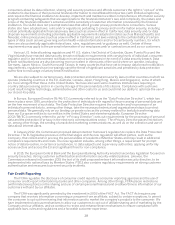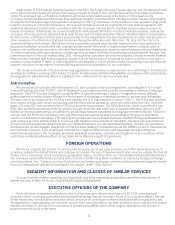American Express 2015 Annual Report Download - page 40
Download and view the complete annual report
Please find page 40 of the 2015 American Express annual report below. You can navigate through the pages in the report by either clicking on the pages listed below, or by using the keyword search tool below to find specific information within the annual report.
The FACT Act also amended the FCRA by adding several provisions designed to prevent or decrease identity theft
and to improve the accuracy of consumer credit information. Our internal policies and standards, as well as our
enterprise-wide data protection, information security and fraud prevention programs, are designed to comply with the
identity theft requirements. The FACT Act also imposes duties on both consumer reporting agencies and on
businesses that furnish or use information contained in consumer credit reports. For example, a furnisher of
information is required to implement procedures to prevent the reporting of any information that it learns is the result
of identity theft. Also, if a consumer disputes the accuracy of information provided to a consumer reporting agency,
the furnisher of that information must conduct an investigation and respond to the consumer in a timely fashion. The
FACT Act also requires grantors of credit that use consumer credit report information in making a determination to
offer a borrower credit on terms that are “materially less favorable” than the terms offered to most of the lender’s
other customers to notify the borrower that the terms are based on a consumer credit report. In such a case the
borrower is entitled to receive a free copy of the report from the consumer reporting agency Since 2011, Dodd-Frank
has required the addition of certain information about credit scores to “risk-based pricing” notices and to adverse
action notices otherwise required by the FCRA. Grantors of credit using prescreened consumer credit report
information in credit solicitations are also required to include an enhanced notice to consumers that they have the
right to opt out from receiving further prescreened offers of credit.
The CARD Act
The CARD Act regulates credit card billing, pricing, disclosure and other practices, as well as certain aspects of gift
certificates, store gift cards and general-use prepaid cards primarily for personal use. Under the CARD Act, issuers
must not open a credit card account or increase a credit line without considering the consumer’s ability to make the
required minimum payments under the terms of the account.
With respect to billing and payment, the CARD Act prohibits a card issuer from treating any payment as late for
any purpose, including imposing a penalty interest rate or late fee, unless the issuer has adopted reasonable
procedures designed to ensure that a periodic statement showing the required minimum payment is mailed to the
consumer at least 21 days before the payment due date.
With respect to pricing, the CARD Act prohibits an issuer from increasing any annual percentage rate (“APR”) on
an outstanding balance, except in specific enumerated circumstances. If an issuer increases an APR, the CARD Act
requires that the issuer periodically reevaluate the APR increase to determine if a decrease is “appropriate.” Penalty
fees for a violation with respect to an account be “reasonable and proportional” to such violation.
With respect to disclosure, the CARD Act generally requires issuers to provide certain repayment disclosures on
periodic statements, such as a disclosure of the total cost to the consumer, including interest charges, of paying off a
balance by making only the required minimum payment each billing cycle. An issuer is also obligated to provide
advance notice prior to making “significant” changes to the terms of an account (such as increasing an APR or a late
fee) and, in some cases, give the consumer the right to reject the proposed change.
Anti-Money Laundering Compliance
American Express is subject to a significant number of AML laws and regulations as a result of being a financial
company headquartered in the United States, as well as having a global presence. In the United States, the majority of
AML requirements are derived from the Bank Secrecy Act, as it has been amended by the Patriot Act. In Europe, AML
requirements are largely the result of countries transposing the 3rd EU Anti-Money Laundering Directive (and preceding
EU Anti-Money Laundering Directives) into local laws and regulations. The 4th EU Anti-Money Laundering Directive was
published in June 2015, which added new AML requirements. Each Member State has two years to transpose the new
Directive into national law. Numerous other countries, such as Argentina, Australia, Canada and Mexico, have also
enacted or proposed new or enhanced AML legislation and regulations applicable to American Express.
The underpinnings of these laws and regulations are the efforts of each government to prevent the financial
system from being used by criminals to hide their illicit proceeds and to impede terrorists’ ability to access and move
funds used in support of terrorist activities. Among other things, these laws and regulations require financial
institutions to establish AML programs that meet certain standards, including, in some instances, expanded reporting,
particularly in the area of suspicious transactions, and enhanced information gathering and recordkeeping
requirements. Any errors, failures or delays in complying with federal, state or foreign AML and counter-terrorist
financing laws could result in significant criminal and civil lawsuits, penalties and forfeiture of significant assets or
other enforcement actions.
American Express has established and continues to maintain a Global Anti-Money Laundering Policy, designed to
ensure that, at a minimum, American Express and all of its businesses are in compliance with all applicable laws, rules
and regulations related to AML and anti-terrorist financing initiatives. The American Express Global Anti-Money
Laundering Policy requires that each American Express business maintains a compliance program that provides for a
system of internal controls to ensure that appropriate due diligence and, when necessary, enhanced due diligence,
including obtaining and maintaining appropriate documentation, is conducted at account opening and updated, as
29
























